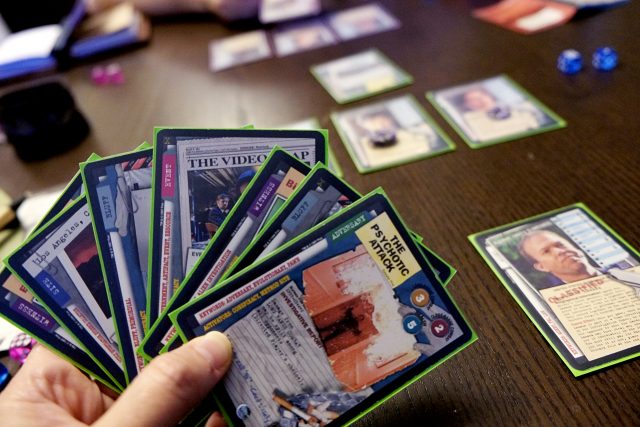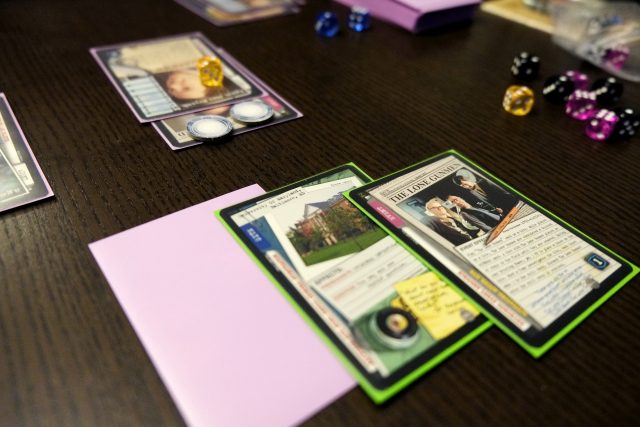Mulder opens a file in the basement. There’s some reports of paranormal activity in a house on the outskirts of Baltimore. Scully, while skeptical that the activities in the house are out of the ordinary, comes along with Mulder. After stopping to requisition some important gear, the two make their way to Baltimore. As they approach the house, a crazed fanatic jumps out from the shadows! Is he a pyromaniac, or can he control fire with his mind!?! Shots are fired! Scully gets badly injured and is rushed to hospital. As she recovers, Mulder discovers a clue to the bigger puzzle of paranormal activity. Was this an episode of the X-Files? I’m not certain. But it is a few turns of The X-Files CCG that I played out.
The X-Files CCG was released in 1996 by the US Playing Card Company – right at the height of the popularity of both the X-Files, and of collectible card games. There were only three sets of The X-Files CCG released, one being mostly a reprint of the original set, but it still has its fans today. While there certainly are some limitations to the game, it introduced some mechanics to CCGs that weren’t seen elsewhere, and does really capture the feel of The X-Files.
At the start of a game of X-Files, you and your opponent secretly select an X-File card. You’re trying to figure out what X-File your opponent has selected before they figure out yours. Each X-File has four unique characteristics: an affiliation, motive, method, and result. Through the game, you will be asking your opponent questions about their X-File: “is your affiliation ‘Occult’? Is your method ‘Manipulation’?” to narrow down what X-File they have. The game, in this aspect, shares enough characteristics with Clue that some have suggested it really is Clue the CCG.
 The first thing you’ll do on your turn is generate a pool of resource points – all your agents create resource points for you every turn. After you’ve done that, your opponent can discard cards from their hand to generate conspiracy points. On the turn that you’re investigating, you’ll use your resource points to buy cards, and your opponent will use conspiracy points to create roadblocks to your investigation. Both the points remain in your pools between turns. When your opponent is investigating, you’ll be throwing up roadblocks with your own conspiracy cards. After you’ve got your resource points, you can spend them to give your agents equipment, and then dispatch them out into the field.
The first thing you’ll do on your turn is generate a pool of resource points – all your agents create resource points for you every turn. After you’ve done that, your opponent can discard cards from their hand to generate conspiracy points. On the turn that you’re investigating, you’ll use your resource points to buy cards, and your opponent will use conspiracy points to create roadblocks to your investigation. Both the points remain in your pools between turns. When your opponent is investigating, you’ll be throwing up roadblocks with your own conspiracy cards. After you’ve got your resource points, you can spend them to give your agents equipment, and then dispatch them out into the field.
Once in the field, you can play locations from your hand for your team of agents to investigate. These locations will have a skill, like Alien Investigation 3+, and a type of question, like Result. This means that if at the end of investigating the site, your group of agents have three or more points of Alien Investigation, you may ask your opponent a question about the result of their X-File. In the course of the investigation, you can play witnesses from your hand, which add to your investigation, and your opponent can play bluffs on the site – which distract you from your goal, or, they can play adversaries. If there’s an adversary at the site, combat begins – with the agents and adversary exchanging damage to each other until one side is eliminated. Both sides can play event cards, which will either help or hurt the investigation effort.
If you’re successful in investigating a site, and you’ve asked your question, you may then choose to ask “is your X-File….” If you guess correctly, you win the game! But, here’s the thing, if you’re wrong – you lose. You have one shot, and one shot only, at guessing your opponent’s X-File. Play continues back and forth, with each player investigating sites while their opponent tries to stop them when acting as the conspiracy. The play feels like an episode of the X-Files. There are agents you know, who encounter weird and strange roadblocks, who may end up stymied by a conspiracy or in the hospital as the result of a paranormal attack. It does feel reminiscent of the show.
That said, there are some serious limitation to the game. First, deck construction feels at times like spreadsheet: the collectible card game. You must have exactly sixty cards in your deck, so you’re trying to balance the skills on your investigators, with the sites you can choose, with the questions you have to ask, and also fit in some cards to play as the conspiracy player.
Gameplay itself is also quite limited. The abilities printed on the Agents can be confusing at times, and more than once when playing we’ve had to end up just ruling “I guess it is played this way?” Not helping this is the graphic design of the cards. Rules text is, on some cards, printed in a smaller font that the flavour text, and many critically important parts of the cards are printed along the sides of the cards, making them hard to read.
Most limiting – which was noticed by everybody I’ve played the game with – playing adversaries is incredibly finicky and unfun. You have to have an adversary in your hand that matches the type of site that your opponent is investigating – a “results” adversary can only be played at a site that asks a results question – on the turn they’re investigating it, and have the points in your pool to pay for the adversary. I’ve just turned to a house rule of “you can play any adversary at any site” which makes the game much more fun and fast-paced.
I’ve also found that the time of the game varies wildly. I’ve played games where you ask, on your first site, “is your affiliation ‘Alien,” and gotten a “yes,” reducing the number of questions I need to ask to eight. However, if you keep getting “no” as an answer, the game will drag on as you are only eliminating an handful of potential X-Files each turn. As a result, your game could be ten minutes, or well over an hour.
 There are also a dizzying number of variants in the rulebook. The rulebook lays out a “basic” and “advanced” mode of play, and some of the cards say “this card does x in basic mode, but y in advanced mode.” If you find yourself playing The X-Files CCG, just play the advanced mode. The basic mode is far too basic. There are optional rules for “killer” cards – cards which remove Agents from play, which is seriously limiting. There is an optional rule for if you guess your opponent’s X-File incorrectly. There are pages of optional rules for variants on the game to be played once characteristics of your X-File are known. For example, if your affiliation is “Alien,” once that’s known, you can start abducting your opponent’s agents. The most maddening aspect is that while there a multitudes of variant formats, the rules leave a number of questions to be answered about basic play. I really wish the game had been streamlined into one, and only one, mode of play.
There are also a dizzying number of variants in the rulebook. The rulebook lays out a “basic” and “advanced” mode of play, and some of the cards say “this card does x in basic mode, but y in advanced mode.” If you find yourself playing The X-Files CCG, just play the advanced mode. The basic mode is far too basic. There are optional rules for “killer” cards – cards which remove Agents from play, which is seriously limiting. There is an optional rule for if you guess your opponent’s X-File incorrectly. There are pages of optional rules for variants on the game to be played once characteristics of your X-File are known. For example, if your affiliation is “Alien,” once that’s known, you can start abducting your opponent’s agents. The most maddening aspect is that while there a multitudes of variant formats, the rules leave a number of questions to be answered about basic play. I really wish the game had been streamlined into one, and only one, mode of play.
The X-Files CCG was released in 1996 – the same year Netrunner was released and a year after the Decipher Star Wars CCG was released. Why am I bringing this up? Netrunner was a purely asymmetrical card game with two sides having different cards and different styles of play. Star Wars was quasi-asymmetrical, with the Light and Dark side using the same types of cards, but building decks from completely different card pools. I really feel like X-Files could have been a much better card game if it was asymmetrical. If one side was playing The Conspiracy, and the other The Agents, with The Conspiracy trying to advance their goals before exposed by The Agents, that would be a really great game. One of my pals suggested that it could also have been a better game if it had mechanisms similar to the Babylon Five CCG, released in 1997, where each player would simultaneously play a site for investigation, but you could investigate any of the sites, and play conspiracy cards at any site, each turn.
Ultimately, is The X-Files CCG a good game? Not really, no. It is, however, a good X-Files game. It does feel like an episode of the X-Files, it plays in a very X-Files manner, and the investigation aspect of the game matches theme with mechanics. My X-files fan pal, who I introduced this to, really quite enjoyed it. Despite some serious limitations in game design and game play, it remains a good game for X-Files fans.
Can I still play The X-Files CCG? Yes, you certainly can. There is a lot of it on eBay, and it’s not overly expensive, as far as dead CCGs go. A box of starters of either Premier or The Truth Is Out There will set you up quite nicely. I suggest The Truth Is Out There, as it solved some of the distribution issues in Premier. Add in a box of boosters from 101361, and you can have a strong range of customizable decks
Who Should Play The X-Files CCG? Fans of The X-Files who are looking for a good X-Files game, or fans of The X-Files who like collectable card games. For all the limitations of the game, it does a good job of feeling like the show, and is designed well enough to be entertaining.
Who Shouldn’t Play The X-Files CCG? If you aren’t a die-hard fan of The X-Files, you probably won’t like this game. Even if you are an X-Files fan, but you like your (CC)Games to be refined, every aspect thought out, and playtested perfectly, you’re going to have some frustrating moments with this game.
Comments
No comments yet! Be the first!